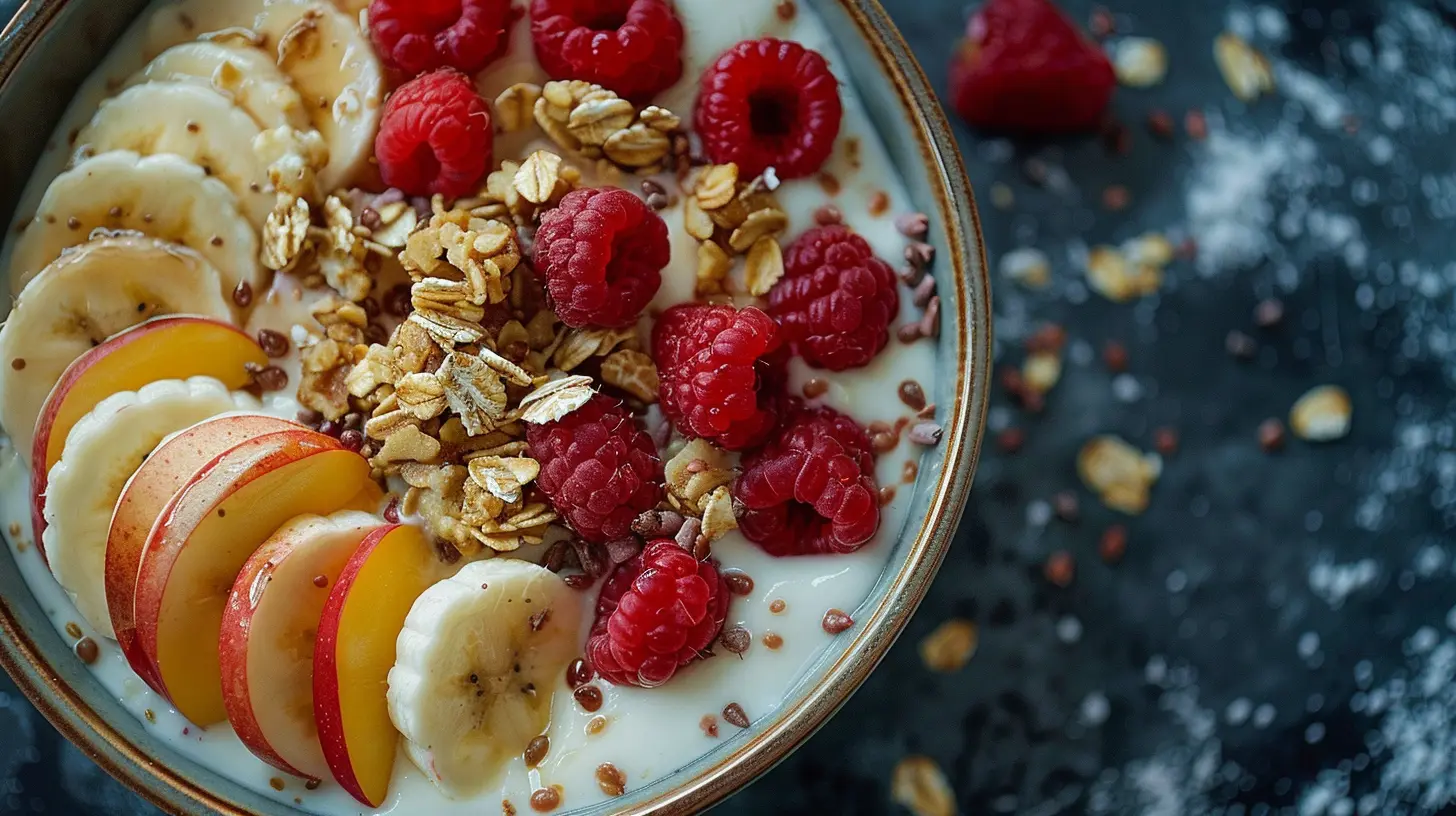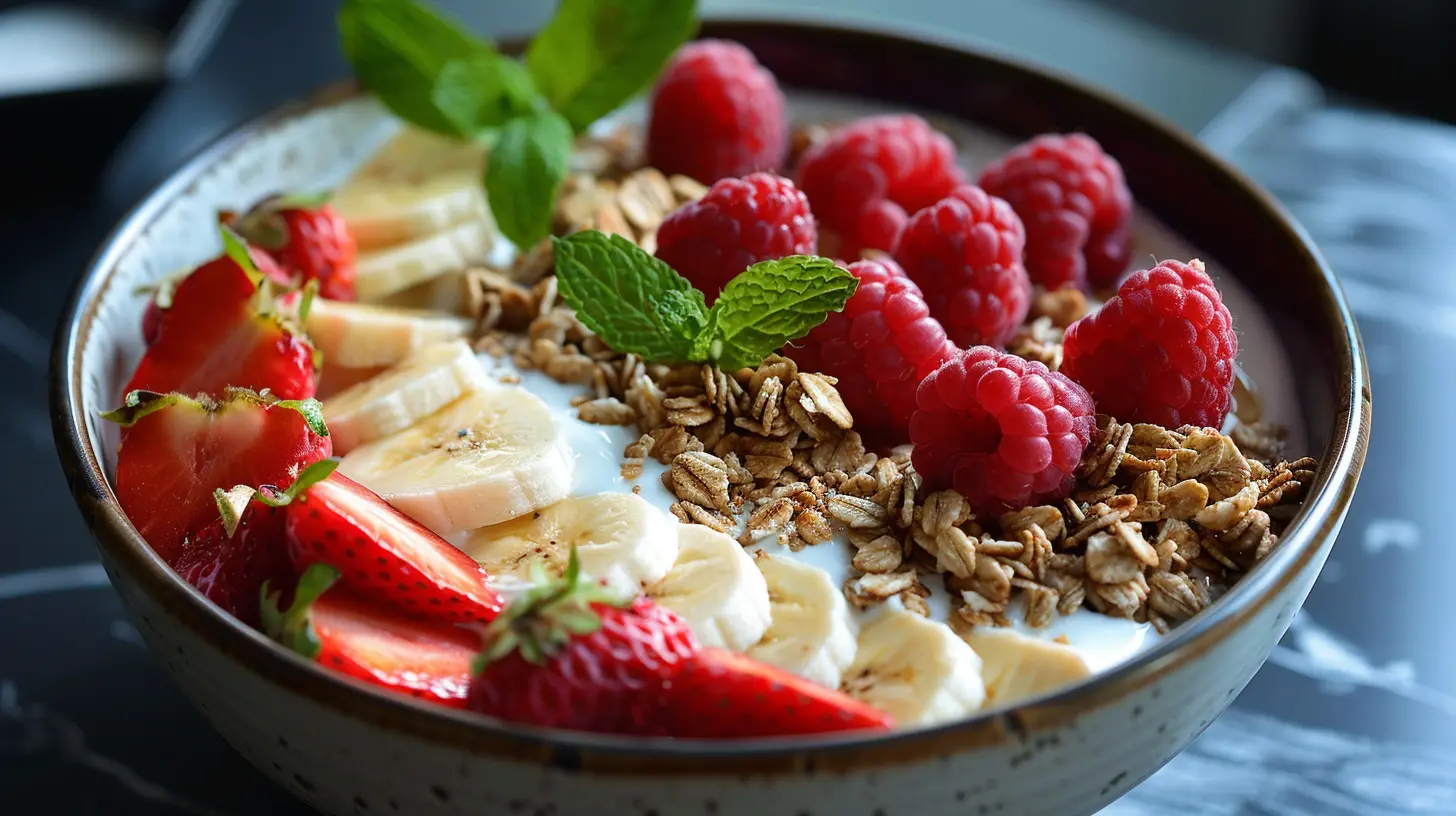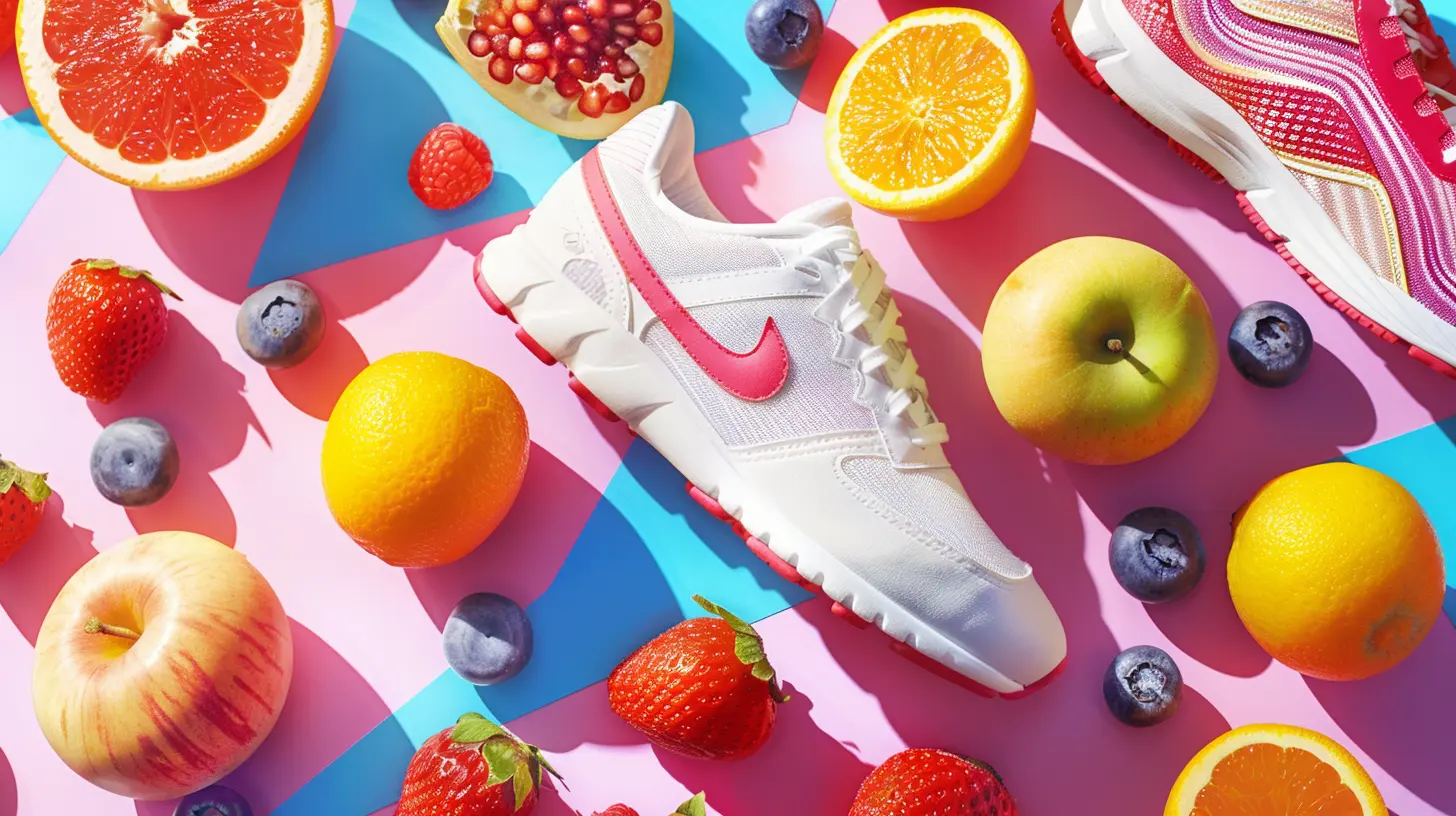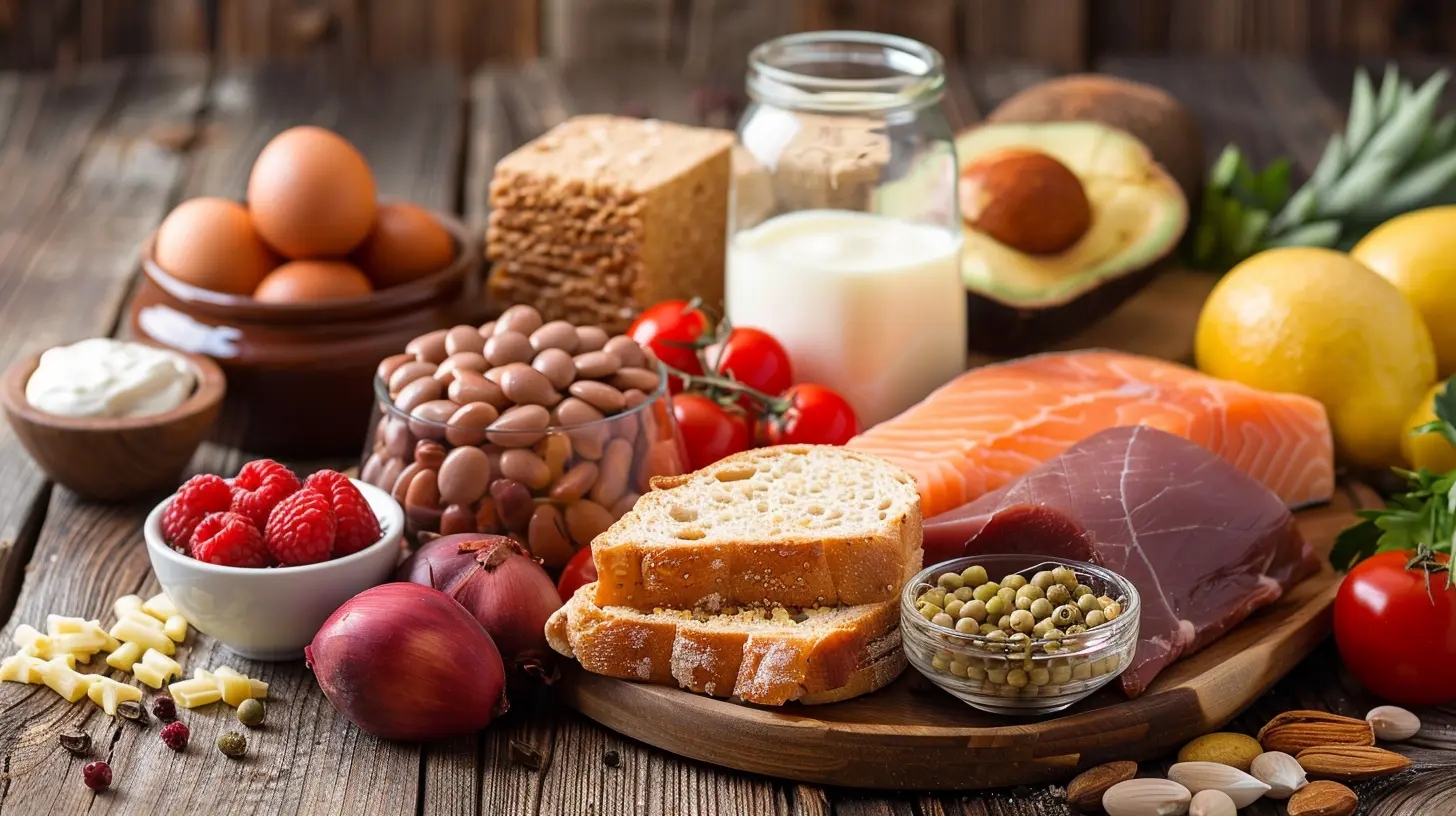The Best Foods to Eat Before and After Your Run
22 December 2024
Running is one of the most efficient and freeing forms of exercise out there. Whether you're a seasoned marathoner or just starting to embrace the runner's high, one thing is for sure—what you eat before and after your run can make or break your performance and recovery. It’s like fueling up your car before hitting the road; you wouldn’t take a long trip without making sure your vehicle has the right kind of gas, right? The same goes for your body.
In this article, we’ll dive deep into the best foods to eat before and after your run, ensuring you’re not only performing at your peak but also recovering like a champ.

Why Nutrition Matters for Runners
Before we get into the nitty-gritty of what specific foods are best, let’s talk about why nutrition matters for runners. Running puts stress on your body, especially your muscles and joints. The right fuel helps your body stay energized, reduces muscle fatigue, and speeds up recovery. Without proper nutrition, you’re at a higher risk of injury, fatigue, and poor performance. Want to avoid hitting that dreaded wall mid-run? Food is your best ally.Energy for Performance
Your body uses two primary sources of energy during a run: carbohydrates and fat. Carbs, especially complex carbohydrates, are your body’s go-to fuel because they’re easy to break down and provide quick energy. Fats, on the other hand, are more of a long-lasting energy source. The trick is balancing these two. Eating the right food before your run ensures you have enough fuel to power through without feeling sluggish or bloated.Recovery and Muscle Repair
After a run, your muscles need time to recover. This is where protein and carbohydrates come in. Protein helps rebuild muscle fibers that have been damaged during exercise, while carbohydrates help replenish glycogen stores. Remember, recovery isn’t just about resting – it’s about refueling smartly.
The Best Foods to Eat Before Your Run
When it comes to pre-run nutrition, timing and food choices are key. Ideally, you want to eat something that gives you sustained energy without weighing you down. What you eat will depend on how far in advance you’re eating before the run.1. 2-3 Hours Before Your Run: Complex Carbohydrates and Protein
If you have a couple of hours before you lace up, this is the perfect window for a slightly heavier meal. You want to focus on complex carbohydrates and a moderate amount of protein. These will provide slow-releasing energy that keeps you going for longer.Examples:
- Oatmeal with Banana and Peanut Butter: Oatmeal is an incredible source of complex carbs, and the banana adds a bit of quick energy in the form of natural sugars. The peanut butter provides healthy fats and a bit of protein.
- Whole Wheat Toast with Avocado and Eggs: The toast gives you the carbs you need, while the avocado provides healthy fats. Eggs are great for protein, helping to stabilize your energy levels.
- Brown Rice with Chicken and Vegetables: If you’re eating before a long-distance run, this wholesome meal is perfect. Brown rice offers slow-releasing carbs, while the chicken provides lean protein.
2. 30-60 Minutes Before Your Run: Simple Carbohydrates
If you don’t have much time before your run, you’ll want to focus on simpler carbohydrates that are easily digestible. Avoid anything too heavy because, let’s be real, no one wants to feel like they’re running with a rock in their stomach.Examples:
- Banana: Bananas are a runner’s best friend. They’re easy to digest, packed with quick energy, and rich in potassium, which helps prevent cramps.
- Energy Bar or Gel: Choose a bar that’s low in fiber but high in carbohydrates. This is great if you’re doing a shorter or moderate run.
- Apple with a Small Spoonful of Peanut Butter: The apple provides quick sugar, while the peanut butter offers just a touch of fat and protein for sustained energy.
3. Hydration: Don’t Forget the Water!
Hydration is just as crucial as what you eat. Drink water throughout the day, but make sure to hydrate properly in the hours leading up to your run. If you’re doing a long or intense run, consider something like a sports drink with electrolytes to keep you balanced.
The Best Foods to Eat After Your Run
So, you’ve smashed your run, and now it’s time to focus on recovery. The foods you eat post-run can help repair muscles, replenish glycogen stores, and get you ready for your next workout. Aim to eat within 30-60 minutes after your run for optimal recovery.1. Protein for Muscle Repair
Protein is essential for repairing and building muscles. After a run, your muscles are eager for amino acids, which are the building blocks of protein. The goal is to consume high-quality protein sources that are easy for your body to digest.Examples:
- Grilled Chicken with Quinoa: Quinoa is a complete protein that also provides carbs for glycogen replenishment. The chicken adds lean, high-quality protein.
- Greek Yogurt with Berries and Honey: Greek yogurt is packed with protein, and the berries provide antioxidants to help reduce inflammation. Add a drizzle of honey for a natural sugar boost.
- Protein Smoothie with Almond Milk, Spinach, and Protein Powder: A smoothie is a great option for those who don’t feel like eating a solid meal immediately after a run. Add some spinach for extra nutrients and either a banana or frozen berries for that perfect post-run recovery shake.
2. Carbohydrates for Glycogen Replenishment
Post-run, your glycogen stores are depleted, especially after a long or intense workout. Eating carbohydrates helps restore those energy levels, making sure you’re ready for the next session.Examples:
- Sweet Potato with Cottage Cheese: Sweet potatoes are rich in complex carbs and vitamins, while cottage cheese adds a good amount of protein.
- Whole Grain Pasta with Marinara and Turkey Meatballs: The carbs from the pasta will replenish glycogen, and the turkey meatballs provide lean protein.
- Rice Cakes with Nut Butter and Honey: This is a light but effective snack for refueling after a run. The rice cakes provide quick carbs, while nut butter gives you some healthy fats and protein.
3. Healthy Fats for Recovery and Inflammation
Healthy fats help reduce inflammation and support overall recovery. While they shouldn't make up the bulk of your post-run meal, a little fat can go a long way.Examples:
- Avocado on Toast with a Poached Egg: Avocados are full of healthy fats, and the toast gives you the carbs you need. The egg adds that much-needed protein.
- Salmon with Brown Rice and Veggies: Salmon is rich in omega-3 fatty acids, which help with inflammation and muscle soreness. Pair it with brown rice for a perfect post-run meal.
- Nuts and Seeds Mix: A handful of almonds or chia seeds is a great way to introduce healthy fats into your post-run snack. They also provide a bit of protein and fiber.
4. Hydration: Replenish Those Fluids
Running makes you sweat, which means you lose water and electrolytes. After your run, it’s essential to rehydrate properly. In addition to water, you might want to consider a drink with electrolytes, especially if you’re running in hot conditions or for an extended period.
Timing Your Meals for Optimal Performance
When it comes to eating before and after your run, timing is everything.- Before Your Run: Aim to eat a meal 2-3 hours before your run or a smaller snack 30-60 minutes before you head out. This gives your body time to digest without feeling sluggish.
- After Your Run: Try to eat within 30 minutes to an hour after your run for the best recovery results. This is when your body is most primed to absorb nutrients and start the rebuilding process.
Foods to Avoid Before a Run
Not all foods are created equal, especially when it comes to running. Some foods can cause bloating, cramping, or even digestive issues. Here are a few things to avoid:- High-Fiber Foods: While fiber is great for overall health, too much of it before a run can lead to digestive discomfort.
- Greasy or Fried Foods: These are heavy and can sit in your stomach, making you feel sluggish or nauseous.
- Too Much Dairy: Dairy affects everyone differently, but for some people, it can cause stomach issues while running.
- Spicy Foods: Spicy foods can cause heartburn or indigestion, both of which are no fun during a run.
Conclusion
Fueling your body with the right foods before and after your run is just as important as your training routine. Think of your body like a high-performance machine—it needs the right fuel to perform at its best. Whether you’re preparing for a race or just going for a casual jog, paying attention to your nutrition can help you feel stronger, run faster, and recover quicker.Remember, everyone’s body is different, so it might take a bit of experimentation to find what works best for you. Listen to your body, and don’t be afraid to tweak your diet to fit your unique needs.
all images in this post were generated using AI tools
Category:
RunningAuthor:

Frankie Bailey
Discussion
rate this article
17 comments
Helen Mitchell
Forget the running shoes—it's all about the snacks! Fuel up with tasty treats before you dash and reward yourself with even tastier bites afterward. Because let’s face it, jogging burns calories just for dessert!
February 26, 2025 at 4:14 AM

Frankie Bailey
Absolutely! Enjoying snacks before and after your run can enhance your performance and make your workout more rewarding. Balance is key!
Penelope McKinney
Great tips! Fueling right enhances performance and recovery—will definitely try these suggestions on my next run!
February 3, 2025 at 3:37 AM

Frankie Bailey
Thank you! I'm glad you found the tips helpful. Enjoy your next run!
Dahlia McKale
Fueling your body correctly is essential for optimal performance and recovery in running. Before a run, focus on easily digestible carbohydrates like bananas or oatmeal to provide energy. Post-run, prioritize proteins and healthy fats—think chicken and avocado—for muscle repair and sustained energy. Proper nutrition enhances both endurance and recovery.
January 29, 2025 at 5:03 AM

Frankie Bailey
Absolutely! Proper nutrition is key for runners. Pre-run carbs like bananas or oatmeal boost energy, while post-run proteins and healthy fats, such as chicken and avocado, aid in recovery. Fueling right enhances performance and endurance!
Lillian Kline
Eat, run, repeat! Fuel up for fun times!
January 23, 2025 at 5:03 AM

Frankie Bailey
Absolutely! Proper fueling is key to enhancing your run and recovery. Enjoy those fun times!
Issac Palmer
Great tips! Fueling properly can truly enhance performance and recovery. Excited to try these food recommendations on my next run! Keep it up!
January 20, 2025 at 5:06 AM

Frankie Bailey
Thank you! I'm glad you found the tips helpful. Enjoy your next run and happy fueling!
Anastasia Wilkins
Great tips! Love how food fuels my runs! 🍌🏃♂️
January 15, 2025 at 8:43 PM

Frankie Bailey
Thanks for the feedback! Fueling your runs is key to performance! 🍏🏃♀️
Shiloh McIlroy
Fuel wisely, run fiercely, recover smarter!
January 9, 2025 at 5:37 AM

Frankie Bailey
Thank you! Fueling wisely and recovering smartly are key to maximizing performance and enjoyment in every run!
Alisha McGrady
Nutrient timing is crucial; balance carbs, proteins, and hydration for optimal performance.
January 6, 2025 at 8:59 PM

Frankie Bailey
Absolutely! Proper nutrient timing with a focus on balanced carbs, proteins, and hydration is key to enhancing your running performance and recovery.
Nixie McAleer
Great read! Fueling up before and refueling after a run can really make a difference. I love grabbing a banana and some nut butter pre-run, and post-run, a smoothie always hits the spot! Can't wait to try some of the other suggestions you’ve shared. Keep up the awesome content! 🏃♂️🍌🥤
January 1, 2025 at 1:33 PM

Frankie Bailey
Thanks for your feedback! I'm glad you found it helpful. Enjoy your runs and those tasty snacks! 🏃♂️🍌🥤
Zinn Sawyer
Fueling our bodies with the right nutrients transforms not just our runs, but our entire relationship with movement, allowing us to connect deeply with ourselves.
December 28, 2024 at 1:04 PM

Frankie Bailey
Absolutely! Nourishing our bodies optimally enhances both performance and our overall connection to movement. Thank you for highlighting this important aspect!
Sage Bell
Thanks for this insightful article! Nutrition plays such a crucial role in our running performance and recovery. It's great to see practical advice on the best foods to fuel up pre-run and replenish post-run. I can't wait to try some of these suggestions on my next run!
December 27, 2024 at 3:40 AM

Frankie Bailey
Thank you! I'm glad you found the article helpful. Enjoy your next run and happy fueling!
Lara Love
Forget the usual carbs! Try a banana-smoothie-sushi burrito before your run—it's the ultimate flavor adventure. Post-run? Nothing beats a high-fiving slice of pizza. Fuel your feet with fun!" 🍕🏃♂️🎉
December 26, 2024 at 8:57 PM

Frankie Bailey
Thanks for the fun suggestion! A banana-smoothie-sushi burrito sounds like a delicious pre-run treat, and who can resist a celebratory slice of pizza afterward? Great way to fuel up! 🍕🏃♂️
Beth Vasquez
Great article! The right pre- and post-run nutrition can significantly enhance performance and recovery. I appreciate the emphasis on balanced meals that include carbohydrates for energy and proteins for muscle repair. Incorporating whole foods and staying hydrated should definitely be top priorities for any runner looking to optimize their routine.
December 26, 2024 at 5:41 AM

Frankie Bailey
Thank you! I'm glad you found it helpful. Proper nutrition truly makes a difference for runners. Happy running!
Rachel McConkey
Great insights! Nutrition plays a crucial role in performance and recovery. I'd love to see more specific examples of meals or snacks that runners prefer. Keep it up!
December 25, 2024 at 4:36 AM

Frankie Bailey
Thank you! I appreciate your feedback and will definitely consider adding specific meal and snack examples for runners in future articles. Stay tuned!
Petra Clark
Running’s tough; carbs are my love language!
December 24, 2024 at 8:06 PM

Frankie Bailey
Absolutely! Carbs provide the energy you need for those tough runs. Enjoy those loves! 🥖🏃♂️
Astoria Henson
Great article! Nutrition plays such a vital role in enhancing performance and recovery. It's inspiring to see how the right foods can fuel our runs and help us achieve our goals. Keep sharing these valuable tips—they motivate us all to make healthier choices for our fitness journeys!
December 23, 2024 at 5:53 AM

Frankie Bailey
Thank you so much for your kind words! I'm glad you found the article inspiring. Fueling our bodies correctly truly makes a difference in our performance and recovery. Happy running!
Jemima Coffey
Running on empty? Not on our watch! Fuel up with banana-power before you hit the track, and treat yourself to a post-run pizza party! Because what’s better than chasing those endorphins? Enjoying a cheesy slice afterwards! Here’s to tasty miles and delicious memories!" 🍕🏃♂️🍌
December 22, 2024 at 1:42 PM

Frankie Bailey
Absolutely! Fueling with bananas before your run and enjoying pizza afterward is a delicious way to boost energy and recovery. Here's to fueling our bodies and making great memories! 🍌🍕🏃♂️
MORE POSTS

The Role of Genetics in Sports: Are Champions Born or Made?

Choosing the Right Bike for Your Cycling Style

How One Team’s Tactical Discipline Overcame the Odds

How to Keep Your Arm Healthy Throughout a Long Baseball Season

The Mental Benefits of Stretching: Relaxation and Focus

The Importance of Rest and Recovery for High School Athletes

Essential Gym Training Tips for Beginners

Sleep and Sports Performance: The Science of Rest and Recovery

Balancing Tradition with Innovation: The Evolution of Coaching Philosophies

How Sports Broadcasters Adapt to Last-Minute Changes

The Role of Hormones in Athletic Performance: Testosterone, Estrogen, and Beyond